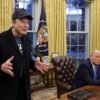WASHINGTON: The United States will “aggressively revoke” the visas of Chinese students studying in the country, Secretary of State Marco Rubio has announced, as the administration of President Donald Trump continues its crackdown on foreign students enrolled at higher education institutions in the US.
Rubio announced the shock move in a post on X, as well as a State Department statement published late on Wednesday, titled “New Visa Policies Put America First, Not China”.
President Donald Trump’s administration has sought to ramp up deportations and revoke student visas as part of wide-ranging efforts to fulfill its hardline immigration agenda.
In a statement, Rubio said the State Department will also revise visa criteria to enhance scrutiny of all future visa applications from China and Hong Kong.
“The U.S. State Department will work with the Department of Homeland Security to aggressively revoke visas for Chinese students,” he said.
The Chinese Embassy in Washington did not immediately respond to a request for comment.
China’s foreign ministry previously vowed to “firmly safeguard the legitimate rights and interests” of its students overseas, following the Trump administration’s move to revoke Harvard University’s ability to enroll foreign students, many of whom are Chinese.
China is also at the epicenter of Trump’s global trade war that has roiled financial markets, upended supply chains and fueled risks of a sharp worldwide economic downturn. The decision to cancel Chinese student visas comes despite a recent pause in the U.S.-China trade dispute.
International students – India and China together accounting for 54% of them – contributed more than $50 billion to the U.S. economy in 2023, according to the U.S. Department of Commerce.
UNIVERSITY TIES TO CHINA UNDER SCRUTINY
The State Department has broad authority to issue and revoke visas. The administration last week cited Harvard University’s ties to China as among several reasons for revoking its ability to enroll foreign students, a move temporarily blocked by a U.S. judge.
Rubio’s statement did not offer details on how extensively the visa revocations would be applied. Even a relatively small number could disrupt the flow of Chinese students seeking out higher education in the U.S. that began in the late 1970s from Communist-governed China.
Recent decades saw the United States become the destination of choice for many Chinese students looking for an alternative to China’s intensely competitive university system and drawn to the strong reputation of U.S. schools. Those students typically come from wealthier families able to afford the high cost of U.S. universities.
Many of those have stayed after graduating and have been credited with contributing to American research capacity and the U.S. workforce.
The number of Chinese students in the U.S. dropped to about 277,000 in 2024, however, from a high of around 370,000 in 2019, pulled lower by growing tension between the world’s two biggest economies, heightened U.S. government scrutiny of Chinese students, and the COVID-19 pandemic.
As the U.S.-China geopolitical rivalry has escalated into what many analysts consider a new form of cold war, U.S. agencies and Congress have stepped up scrutiny of China’s state-sponsored influence and technology transfers at American colleges and universities.
Washington has become increasingly concerned that Beijing uses open and federally funded research environments in the U.S. to circumvent export controls and other national security laws.



